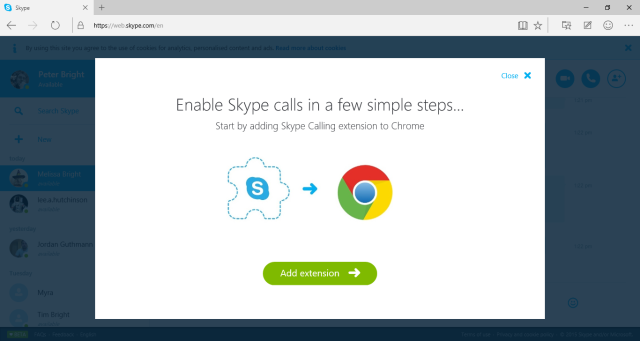Last year Microsoft said it was building a Web client for Skype, and it has been operating in a very limited beta since then. Today, the beta got opened up to every Skype user in the US and UK, with the rest of the world being added in coming weeks.
Microsoft's longterm plan is to use an API called ORTC (Object Real-Time Communications) that is currently being developed by Microsoft, Google, and others. However, this specification is not complete, with only Microsoft's Edge browser likely to support it any time soon. To fill this gap, Skype for Web currently depends on a range of browser plugins and extensions.

In our quick testing, these plugins earn their beta branding. Everything worked as it should in Internet Explorer 11 in Windows 8.1, with both voice and video looking and sounding as good as they ever do in the full Skype client and video neatly integrated into the browser window. It wasn't quite perfect; there was no true full-screen mode (going full screen just filled the browser window, not the screen), and there appears to be no configurability at all. If you have multiple cameras or audio devices, it seems that Skype will pick one all by itself.
Our experience in other browsers and on other platforms was less satisfactory. On OS X, only Safari seems to be supported, and for some reason, any attempt to start a video call crashed the browser. Answering video calls didn't crash, but it didn't show any video, either; only audio worked.
Chrome in Windows uses a combination of an extension and a separate executable (presumably to work around Chrome's removal of plugin support). This lacks the neat integration of the Internet Explorer plugin, with Skype video instead being in a separate pop up window. However, when we tried it, the window appeared to do nothing; outgoing calls never reached their recipients, and incoming calls never successfully picked up.
These beta quirks aside, Skype for Web looks and acts much like its desktop counterpart in single window view. In Chrome, the Web app takes advantage of Chrome's pop up notifications to alert users to new messages.

The current dependence on plugins is most problematic in Microsoft's own flagship browser: Edge. Edge doesn't support plugins at all. Skype for Web erroneously identifies it as Chrome and tries to install the Chrome extension. Naturally, this doesn't work in Edge. Although it will eventually support Chrome-like extensions, this support won't materialize until after the initial release of Windows 10.
reader comments
45